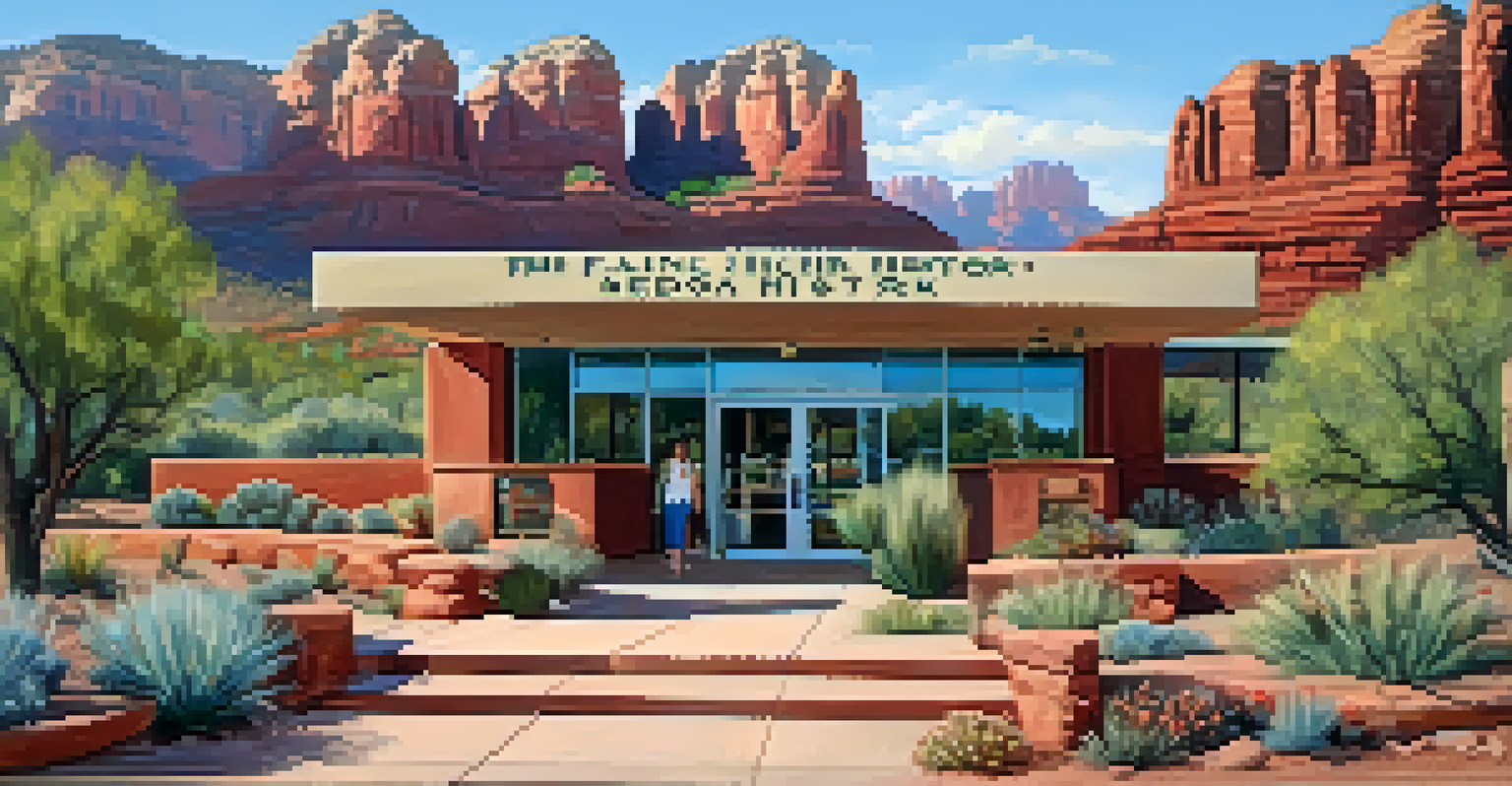Family History Centers: Support for Sedona Genealogists

Understanding Family History Centers and Their Mission
Family History Centers are local branches that provide resources for genealogical research. Established by The Church of Jesus Christ of Latter-day Saints, these centers aim to help individuals trace their ancestry and connect with their roots. They offer a welcoming environment for everyone, from beginners to seasoned genealogists, making it easy to start or continue one’s family history journey.
Genealogy is not just about the past; it's about connecting with our present and future.
These centers are stocked with a wealth of resources, including access to genealogy databases, historical records, and family trees. They not only provide physical materials but also offer guidance from trained staff and volunteers who are passionate about family history. For Sedona residents, this can be a game-changer in accessing valuable information without the need to travel far.
Whether you’re looking to uncover your great-grandparents' names or trace your lineage back hundreds of years, Family History Centers are dedicated to supporting your research. The services are often free or very low-cost, ensuring that anyone can embark on their genealogical journey with minimal financial barriers.
Benefits of Local Family History Centers for Sedona Residents
For residents of Sedona, the proximity of a Family History Center means easy access to genealogical resources and support. These centers often have local records that might not be available online, making them invaluable for those looking to dive deeper into their family history. This local focus allows individuals to discover connections and stories unique to their community.

Additionally, Family History Centers frequently host workshops and classes that cover various aspects of genealogy. These educational opportunities can help you learn how to use different tools and databases effectively. By participating, you can gain insights from experienced genealogists, making your research process more efficient and enjoyable.
Local Resources for Genealogy Help
Family History Centers provide Sedona residents with easy access to valuable genealogical resources and local records that enhance their research.
Moreover, the community aspect of these centers cannot be overstated. Meeting fellow genealogy enthusiasts creates a supportive network where you can share tips, resources, and stories. This camaraderie can be incredibly motivating, especially when you hit a research roadblock and need encouragement to keep going.
How to Utilize Family History Centers Effectively
To make the most of your time at a Family History Center, it’s helpful to come prepared with specific goals. Whether you’re seeking to confirm a family story or explore new branches of your family tree, having a plan can streamline your visit. Start with what you know and build from there, as this will help staff assist you more effectively.
Every family has a story to tell; it’s our job to find it.
Don’t hesitate to ask for help! The staff and volunteers at Family History Centers are there to guide you and share their expertise. They can show you how to navigate databases, interpret records, and even suggest strategies for overcoming common challenges in genealogy. Remember, everyone was a beginner at some point, and they are eager to help you succeed.
Lastly, take advantage of the technology available at these centers. Many locations offer computers with genealogy software and access to premium databases. Utilizing these tools can significantly enhance your research experience and open up new avenues of discovery.
Exploring Online Resources Through Family History Centers
While Family History Centers offer physical resources, they also provide access to a wealth of online databases. This includes popular genealogy sites like Ancestry.com and FamilySearch, which you can use for free at the center. By leveraging these platforms, you can search for records, photos, and family trees from the comfort of the center’s facilities.
Many centers also offer virtual resources and classes, allowing you to continue your genealogical research from home. This flexibility means that you can learn at your own pace and fit genealogy into your busy schedule. Online forums and webinars can also connect you with a wider community of genealogists who can offer additional support and insight.
Community Support for Genealogists
These centers foster a sense of community, allowing genealogists to connect, share experiences, and collaborate on research efforts.
Accessing these online resources through a Family History Center can be especially beneficial for Sedona residents. The ability to research both local and global ancestry records opens up new possibilities for discovering your heritage. You never know what might come to light with just a little bit of research!
Connecting with Other Genealogists in Sedona
Family History Centers serve as a hub for local genealogists to connect and collaborate. Many centers host regular meetings and events where individuals can share their experiences and findings. These gatherings foster a sense of community, making it easier for Sedona residents to find like-minded individuals passionate about genealogy.
By attending these events, you can form valuable connections that may lead to new discoveries. Sharing your family history challenges and successes can inspire others and may even result in collaborative research efforts. There’s something incredibly rewarding about working together towards a common goal, especially when it involves piecing together family histories.
Don’t underestimate the power of networking in genealogy. Engaging with fellow researchers at Family History Centers can lead to newfound friendships and mentorship opportunities. Plus, you might just uncover the missing link in your family tree by collaborating with someone else on a shared ancestor.
Preserving Family History: The Role of Family History Centers
Preserving family history is a crucial aspect of genealogy, and Family History Centers play an essential role in this process. Many centers provide resources for digitizing and archiving family documents, photos, and stories. This ensures that precious memories are not lost to time and can be shared with future generations.
Another important service offered is guidance on how to properly organize and store family records. Having a well-organized system can make it easier to conduct research and share findings with family members. Family History Centers often provide tips and techniques for maintaining both physical and digital archives, helping you keep your family history accessible.
Preserving Family Histories Together
Family History Centers play a crucial role in helping individuals digitize, organize, and share their family histories for future generations.
Moreover, many centers encourage individuals to participate in preserving their family narratives through storytelling. By capturing the stories behind the records, you create a richer family history that can be cherished by future generations. This emphasis on storytelling adds depth to your genealogy research, making it more meaningful.
Getting Started: Visiting Your Local Family History Center
If you’re ready to explore your ancestry, visiting your local Family History Center is a fantastic first step. Start by locating the nearest center in Sedona, and check their hours of operation online. Many centers welcome walk-ins, but it’s always a good idea to call ahead to confirm availability and schedule an appointment if needed.
Before your visit, gather any relevant information you already have about your family. This could include names, dates, and places associated with your ancestors. Having this background information will make it easier for the staff to assist you in your search. You might even want to bring along a notebook to jot down important information and ideas as you go.

Finally, approach your research with curiosity and an open mind. Genealogy is often a journey filled with surprises, and you may uncover unexpected stories or connections. Enjoy the process, and remember that every step you take brings you closer to understanding your family’s unique history.